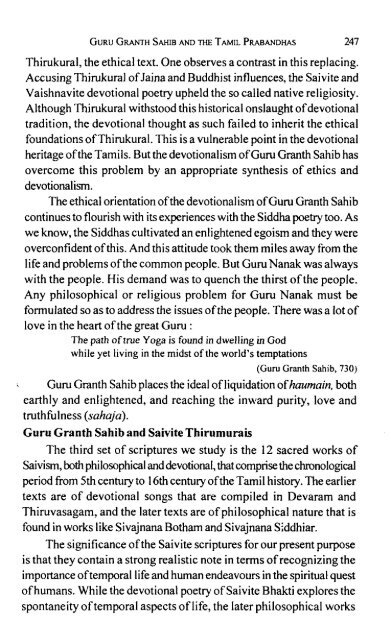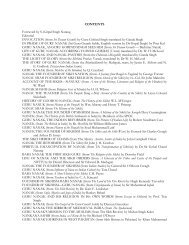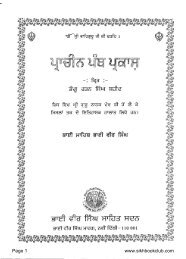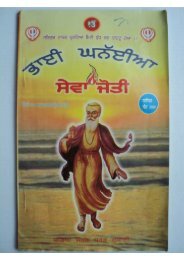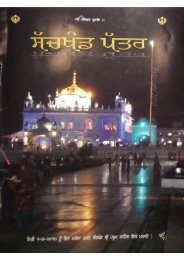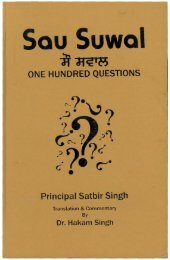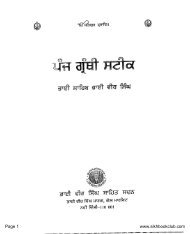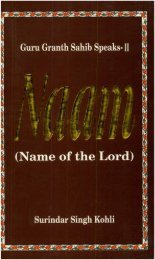- Page 1 and 2:
" • • IBO-GRANTU SAHIB AMONG IH
- Page 4 and 5:
GURU GRANTH SAHIB AMONG THE SCRIPTU
- Page 6:
FOREWORD Four Hundredth Prakash Div
- Page 9 and 10:
(viii) GURU GRANTH SAHIB AMONG THE
- Page 11 and 12:
(x) GURU GRANTH SAHIB AMONG THE SCR
- Page 13 and 14:
(xiO GURU GRANTII SAHIB AMONG THE S
- Page 16 and 17:
Foreword Introduction CONTENTS (v)
- Page 18 and 19:
Inaugural Address THE THEORY OF THE
- Page 20 and 21:
THE THEORY OF THE NAME 3 man realiz
- Page 22 and 23:
THE THEORY OF THE NAME 5 transcende
- Page 24 and 25:
THE AD! GRANTH : AN ApPRECIATION 7
- Page 26 and 27:
THE AD! GRANTH : AN ApPRECIAnON 9 T
- Page 28 and 29:
THE AD! GRANTH : AN ApPRECIATION II
- Page 30 and 31:
THE AD! GRANTH : AN ApPRECIATION 13
- Page 32 and 33:
THE AD! GRANTH : AN ApPRECIATION 15
- Page 34 and 35:
THE Am GRANTH : AN ApPRECIATION 17
- Page 36 and 37:
THE AD! GRANTH : AN ApPRECIATION in
- Page 38 and 39:
THE MAKING OF GURU GRANTH SAHIB 21
- Page 40 and 41:
THE MAKING OF GURU GRANTH SAHIB 23
- Page 42 and 43:
THE MAKING OF GURU GRANTH SAHIB 25
- Page 44 and 45:
THE MAKl}OG OF GURU GRANTH SAHIB 27
- Page 46 and 47:
THE MAKING OF GURU GRANTH SAHIB 29
- Page 48 and 49:
THE MAKING OF GURU GRANTII SAHIB 31
- Page 50 and 51:
THE MAKING OF GURU GRANTH SAHIB 33
- Page 52 and 53:
THE MAKING OF GURU GRANTH SAHIB 35
- Page 54 and 55:
THE MAKING OF GURU GRANTH SAHIB 37
- Page 56 and 57:
THE MAKING OF GURU GRANTH SAHIB 39'
- Page 58 and 59:
FORMATfO~ OF GURU GRANTH SAWS 41 in
- Page 60 and 61:
FORMATION OF GURU G~ANTH SAHIB 43 i
- Page 62 and 63:
FORMATION OF GURU GRANnI SAHIB 45 t
- Page 64 and 65:
FORMATION OF GURU GRANTH SAHIB 47 c
- Page 66 and 67:
FORMAlIOl\ OF GCRC GRAS III SNHB 49
- Page 68 and 69:
FORMATION OF GURU GRANTH SNUB 51 de
- Page 70 and 71:
SRi GURU GRANTH SAHiB: A DISTlNCTIV
- Page 72 and 73:
kNam Ik Karla /k Purakh Ik Nirbhau
- Page 74 and 75:
SRI GURU GRA.'\lTIl SAHIB: A DISTIN
- Page 76 and 77:
SRI GLRC GRANTH SAI/lA: A DISTINCTI
- Page 78 and 79:
SRI GURU GRANTH SAHIB: A DISTINCTIV
- Page 80 and 81:
SRI GURU GRANTH SAllJ13 : A DISTINC
- Page 82 and 83:
SRI GURU GRANTH SAHIB: A DISTINCTIV
- Page 84 and 85:
SRI GURU GRANTH SAHIB: A DISTlNc:TI
- Page 86 and 87:
SOME UNIQUE FEATURES Of THE HOLY GU
- Page 88 and 89:
SOME UNIQuE FEATURES OF THE HOLY GU
- Page 90 and 91:
SOME U?\IQUE FEATURES OF THE HOLY G
- Page 92 and 93:
SOME UNIQUE FEATURES OF TilE HOLY G
- Page 94 and 95:
SOME UNIQUE FEATURES OF THE HOLY GU
- Page 96 and 97:
SRI GURU GRANTH SAHIB AS TIlE LIVIN
- Page 98 and 99:
SRI GURU GRANTH SAHIB AS mE LIVING,
- Page 100 and 101:
SRI GURU GRANTH SAHIB A~ TI1E LIVIN
- Page 102 and 103:
SRI GURU GRANTII SAHIB AS THE LIVIN
- Page 104 and 105:
SRI GURU GRANTH SAHIB AS TIlE LIVIN
- Page 106 and 107:
SRI GURU GRANTH SAIIIB AS THE LIVIN
- Page 108 and 109:
SRI GURU GRANTH SAHIB AS THE LIVING
- Page 110 and 111:
SRI GURU GJ
- Page 112 and 113:
SRI GURU GRANTH SAHIB AS mE LIVING,
- Page 114 and 115:
SRI GURU GRANTH SAHIB AS THE LIVING
- Page 116 and 117:
RECENT WORLD THOUGHT AND SRI GURU G
- Page 118 and 119:
RECENT WORLD THOUGHT AND SRI GURU G
- Page 120 and 121:
RECENT WORLD THOUGHT AND SRI GURU G
- Page 122 and 123:
RECENT WORLD THOUGHT AND SRI GURU G
- Page 124 and 125:
BHAGAT BANI IN GURU GRANTH SAHIB Sh
- Page 126 and 127:
BHAGAT BANI IN GURU GRANTH SAHIB 10
- Page 128 and 129:
BHAGAT BANI IN GURU GRfu'lTH SAHIB
- Page 130 and 131:
BH/\GAT BANI IN GURU GRANTH SAHIB 1
- Page 132 and 133:
BHAGAT BA:"III' GURU GRANTH SAHIB 1
- Page 134 and 135:
BHAGAT BANIlN GURU GRANTH SAHIB 117
- Page 136 and 137:
ETHICAL CONCERNS OF GURU GRANTH SAH
- Page 138 and 139:
ETHICAL CO!':CERNS OF GURU GRANTH S
- Page 140 and 141:
ETHICAL CO:-;CER:-;S OF GURU GRANTH
- Page 142 and 143:
~THICAL CONCERNS OF GURU GRANTH SAH
- Page 144 and 145:
ETHICAL CO~CERNSOr GCRLJ GRANTH SAH
- Page 146 and 147:
RAAG PARBANDH OF SRI GURU GRANTH SA
- Page 148 and 149:
RAAG PARBANDH OF SRI GURU GRANTH SA
- Page 150 and 151:
RAAG PARBANDH OF SRI GURU GRANTH SA
- Page 152 and 153:
RAAG PARBA.'\DH or SRI GURU GRANTH
- Page 154 and 155:
SRI GURU GRANTH SAHIB AND THE GENDE
- Page 156 and 157:
SRI GURU GRAKrH SAHIB AND TilE GEND
- Page 158 and 159:
SRI GURU GRANTH SAHIB AND THE GENDE
- Page 160 and 161:
SRI GURU GRANTH SAHIB AND THE GENDE
- Page 162 and 163:
SRI GURU GRANTH SAHIB AND THE GENDE
- Page 164 and 165:
GURU GRANTH SAHIB AMONG THE SIKH DI
- Page 166 and 167:
GURU GRA:'-1TH SAHIB AMONG THE SIKH
- Page 168 and 169:
GCRU GRANTH SAHIB AMONG THE SIKH DI
- Page 170 and 171:
GURU GRANTH SAHIB AMONG TIfE SIKH D
- Page 172 and 173:
GURU GRANTH SAHIB AMONG TIlE SIKH D
- Page 174 and 175:
GURU GRANTH SAHIB AMONG THE SIKH DI
- Page 176 and 177:
GURU GRANTH SAHIB AMONG THE SIKH DI
- Page 178 and 179:
GURU GRANTH SAHIB AMONG THE SIKH DI
- Page 180 and 181:
GURU GRA~TH SAHIB A,\10NG THE SIKH
- Page 182 and 183:
GURU GRANTH SAHIB AMONG THE SIKH DI
- Page 184 and 185:
GL:RI) GRANTII SAHIB A!vlONG TIlE S
- Page 186 and 187:
SCRIPTURE AS A GENERIC CONCEPT G. G
- Page 188 and 189:
SCRIPTURE AS A GENERIC CONCEPT \7\
- Page 190 and 191:
SCRIPTURE AS A GENERIC CONCEPT 173
- Page 192 and 193:
SCRIPTURE AS A GENERIC CONCEPT 175
- Page 194 and 195:
SCRIPTt;RE AS A GE~ERrC CONCEPT 177
- Page 196 and 197:
SCRIPTuRE AS A GENERIC CO:-;CEPT 17
- Page 198 and 199:
SCRIPTURE AS A GENERIC CO:-lCEPT 18
- Page 200 and 201:
GURU GRANTH SAHIB AND THE VEDAS N.S
- Page 202 and 203:
GUKI; GRANTH SAHIB AND THE VEDAS 18
- Page 204 and 205:
GURU GRANTH SAHIB A:\D THE VEDAS 18
- Page 206 and 207:
GURu GRANTH SAlIlB AND THE VEDAS 18
- Page 208 and 209:
Gt;RU GRANTII SAHIl3 A~D THE VEDAS
- Page 210 and 211:
GURU GRANTH SAHIB AND THE VEDAS Bra
- Page 212 and 213:
Gr.;RU GRA:"TIf SAHIB ,\:"0 THE VED
- Page 214 and 215: GURU GRANTH SAHIB AND THE VEDAS 197
- Page 216 and 217: GURU GRANTH SAHIB AND THE VEDAS 199
- Page 218 and 219: GURU GRANTH SAHIB AKD THE VEDAS 201
- Page 220 and 221: GURU GRANTH SAHIB AND THE VEDAS 203
- Page 222 and 223: vrnn ~ ~lffi1 GURU GRANTlI SAHlI3 A
- Page 224 and 225: 30. ~-::i~~fc)~~ ~
- Page 226 and 227: GuRU GRANTH SAHJ13 AND THE VEDAS 20
- Page 228 and 229: 212 GURU GRANTH SAHIB AMONG THE SCR
- Page 230 and 231: A STUDY OF SIKHISM TN BUDDHISTIC PE
- Page 232 and 233: A STUDY OF SIKHISM IN BUDDHISTIC PE
- Page 234 and 235: A STUDY Of SIKHISM IN BUDDHISTIC PE
- Page 236 and 237: A STUDY OF SIKHISM IN BUDDHISTIC PE
- Page 238 and 239: A Sn;DY OF SIKHISM IN BUDDHISTIC PE
- Page 240 and 241: A STUDY OF SIKHISM TN BUDDHISTIC PE
- Page 242 and 243: A STUDY OF SIKHISM IN BUDDHISTIC PE
- Page 244 and 245: THE HOLY QUR'AN AND SRI GURU GRANTH
- Page 246 and 247: THE HOLY QUR'AN AND SRI GURU GRANTH
- Page 248 and 249: GURU GRANTH SAHIB: A MUSLIM PERCEPT
- Page 250 and 251: GlJRU GRANTJ-l SAHIB: A MUSLIM PERC
- Page 252 and 253: GURU GRANTII SAHIB: A MUSLIM PERCEP
- Page 254 and 255: GURU GRANTH SAHIB: A MUSLIM PERCEPT
- Page 256 and 257: GURU GRANTH SAHIB AND THE TAMIL PRA
- Page 258 and 259: GURU GRANTII SAHIB AND THE TAMIL PR
- Page 260 and 261: GURU GRANm SAHIB AND mE TAMIL PRABA
- Page 262 and 263: GURU GRANTH SAHIB AND THE TAMIL PRA
- Page 266 and 267: GURU GRANTH SAHIB AND THE TAMIL PRA
- Page 268 and 269: CONTRIBUTORS I. Professor J.P.S. Ub
- Page 270: CONTRIBUTORS 2';3 17. Prof. Sanghas


